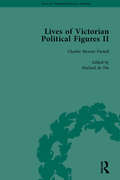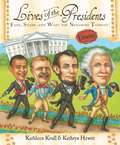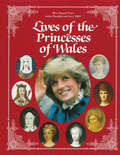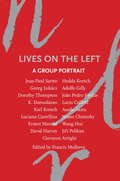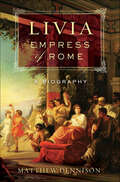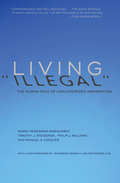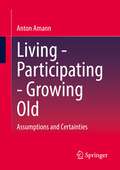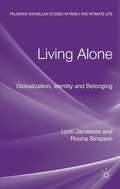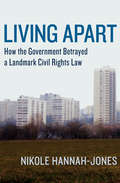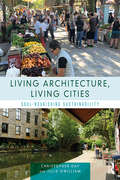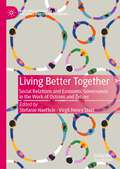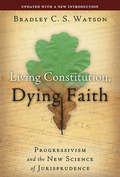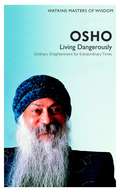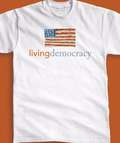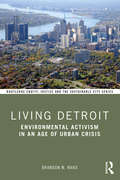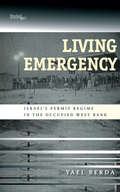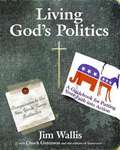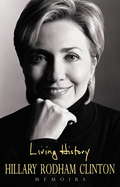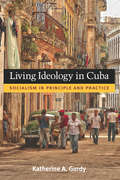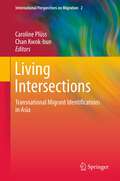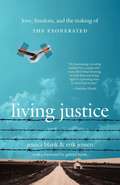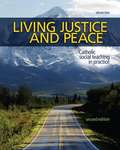- Table View
- List View
Lives of Victorian Political Figures, Part II, Volume 2: Daniel O'Connell, James Bronterre O'Brien, Charles Stewart Parnell and Michael Davitt by their Contemporaries
by Michael Partridge Nancy LoPatin-LummisLooks at the lives and politics of four of the key players in the independence and labour movements of the 19th century: Daniel O'Connell (1775-1847); Charles Stewart Parnell (1846-91); Michael Davitt (1846-1906); and James Bronterre O'Brien (1805-64). Volume 2 looks at the life of Charles Stewart Parnell.
Lives of the Presidents
by Kathleen Krull Kathryn HewittEvery U.S. president is the focus of public scrutiny, but how well do we know these men? What kind of fathers do presidents make? Husbands? Neighbors? <P><P>Other books focus on the historical achievements of those who have occupied our country's highest office; Lives of the Presidents looks instead at their bad habits, silly nicknames, and strange pets. Every president--from George Washington to Bill Clinton--is included, with an emphasis on those who have had the greatest impact on history. <P><P>Discover their high points, low points, and the times in between. In this stunning addition to their acclaimed series, Kathleen Krull and Kathryn Hewitt take us beyond politics and photo opportunities, revealing the entertaining, complex, and very real lives of the presidents.
Lives of the Princesses of Wales
by Mary Beacock Fryer Arthur Bousfield Garry ToffoliBeautifully illustrated, this book looks at the nine women who have been Princesses of Wales. From Joan, the "Fair Maid of Kent," through the tragic Katharine of Aragon, Henry’s VIII’s first wife, and the tempestuous Caroline of Brunswick, the mistreated wife of George IV, to the present fairy-tale, headline-catching Princess, their stories are told with insight and compassion.
Lives on the Left
by Noam Chomsky Luciana Castellina Giovanni Arrighi Francis Mulhern Akira AsadaThe extended critical interview is especially flexible as a form, by turns tenacious and glancing, elliptical or sustained, combining argument and counter-argument, reflection, history and memoir with a freedom normally denied to its subjects in conventional writing formats. Lives on the Left brings together sixteen such interviews from New Left Review in a group portrait of intellectual engagement in the twentieth century and since.Four generations of intellectuals discuss their political histories and present perspectives, and the specialized work for which they are, often, best known. Their recollections span the century from the Great War and the October Revolution to the present, ranging across Europe, the Americas, Africa and Asia. Psychoanalysis, philosophy, the gendering of private and public life, capital and class formation, the novel, geography, and language are among the topics of theoretical discussion. At the heart of the collection, in all its diversity of testimony and judgement, is critical experience of communism and the tradition of Marx, relayed now for a new generation of readers.Lives on the Left includes interviews with Georg Lukács, Hedda Korsch, Jean-Paul Sartre, Dorothy Thompson, Jiri Pelikan, Ernest Mandel, Luciana Castellina, Lucio Colletti, K. Damodaran, Noam Chomsky, David Harvey, Adolfo Gilly, João Pedro Stédile, Asada Akira, Wang Hui and Giovanni Arrighi.New Left Review was founded in 1960 in London, which has remained its base ever since. In fifty years of publication, it has won an international reputation as an independent journal of socialist politics and ideas, attracting readers and contributors from every part of the world. A Spanish-language edition is published bi-monthly from Madrid.
Livia, Empress of Rome: A Biography
by Matthew DennisonRome is a subject of endless fascination, and in this new biography of the infamous Empress Livia, Matthew Dennison brings to life a woman long believed to be one of the most feared villainesses of history.Second wife of the emperor Augustus, mother of his successor Tiberius, grandmother of Claudius and great grandmother of Caligula, the empress Livia lived close to the center of Roman political power for eight turbulent decades. Her life spanned the years of Rome's transformation from Republic to Empire, and witnessed both its triumphs under the rule of Augustus and its lapse into instability under his dysfunctional successor.Livia was given the honorific title Augusta in her husband's will, and was posthumously deified by the emperor Claudius—but posterity would prove less respectful. The Roman historian Tacitus anathematized her as "malevolent" and a "feminine bully" and inspired Robert Graves's celebrated twentieth-century depiction of Livia in I, Claudius as the quintessence of the scheming matriarch, poisoning her relatives one by one to smooth her son's path to the imperial throne.Livia, Empress of Rome rescues the historical Livia from the crude caricature of popular myth to paint an elegant and richly textured portrait. In this rigorously researched biography, Dennison weighs the evidence found in contemporary sources to present a more nuanced assessment. Livia's true "crime," he reveals, was not murder but the exercise of power. The Livia who emerges here is a complex, courageous and gifted woman, and one of the most fascinating and perplexing figures of the ancient world.
Living "Illegal": The Human Face of Unauthorized Immigration
by Timothy J. Steigenga Marie Friedmann Marquardt Philip J. Williams Manuel A. VásquezA myth-busting account of the tragedies, trials, and successes of undocumented immigration in the United States. For decades now, America&’s polarizing debate over immigration revolved around a set of one-dimensional characters and unchallenged stereotypes. The resulting policies—from the creation of ICE in 2003 to Arizona&’s draconian law SB 1070—are dangerous and profoundly counterproductive. Based on years of research into the lives of ordinary migrants, Living &“Illegal&” offers richly textured stories of real people—working, building families, and enriching their communities even as the political climate grows more hostile. In the words of Publishers Weekly, it is a &“compassionate and well-reasoned exploration of why migrants come to the U.S. and how they integrate into American society.&” Moving beyond conventional arguments, Living &“Illegal&” challenges our assumptions about who these people are and how they have adapted to the confusing patchwork of local immigration ordinances. This revealing narrative takes us into Southern churches (often the only organizations open to migrants), into the fields of Florida, onto the streets of major American cities during the immigrant rights marches of 2006, and across national boundaries—from Brazil to Mexico and Guatemala.
Living - Participating - Growing Old: Assumptions and Certainties
by Anton AmannLife must be understood as the result of evolution, and human life as the emergence of the species Sapiens from the genus Homo of the family of apes. If the emergence of human life as an evolutionary fact is coupled with the notion of social life, we are referred to the constructive production of human life forms, of which social participation is an integral part. On the one hand, participation is tied back to the phylogenesis of the species Sapiens, but on the other hand, it has to be newly acquired and practiced by every human being in the process of ontogenesis, depending on the environment. Participation in old age is a separate specification of the conditions of this process and can be illustrated on the basis of a large number of empirical findings.
Living Alone
by Lynn Jamieson Roona SimpsonIn Northern Europe almost half of households consist of one person. Rates of living alone are lower in the Global South but the trend is still on theincrease. Prevalent first among the elderly, living alone then becomes common at ages associated with partners and children. Fears about the end of family and community combine with stereotypes, the 'sad and lonely' or 'selfish singles', in popular depictions. This groundbreaking and highly original study brings evidence to the core debates about contemporary social change in the context of globalization, exploringindividualization and social connection, the future of family formation, consumption and identities, the relevance of place - rural or urban -in mobile worlds, sexuality, belonging and 'community', living arrangements and sustainability. This book presents a systematic sociological analysis of the growing trend of solo living across the globe, while also drawing on the voices of working-age men and women living in urban and rural areas in the UK. "
Living Apart
by Nikole Hannah-JonesProPublica's groundbreaking investigation into housing segregation, and the federal government's large-scale failure to uphold the laws meant to prevent itMore than forty years after President Johnson signed the landmark Fair Housing Act into law, residential segregation in America remains unresolved. Designed to help dismantle the nation's racially divided housing patterns, the act has gone largely ignored by every presidential administration--Democrat and Republican alike--since 1968. In Living Apart, ProPublica investigates this failing, particularly how subsequent leaders, following President Nixon's lead, have declined to use the billions in grant dollars awarded by the Department of Housing and Urban Development as leverage to fight segregation. Their reluctance to enforce a law passed by both houses of Congress and repeatedly upheld by the courts reflects a larger political reality. Again and again, attempts to create integrated neighborhoods have foundered This ebook includes an exclusive afterword by the author, as well as an appendix of original documents dating from the Nixon administration, revealing the internal politics swirling around the Fair Housing Act shortly after its enactment.
Living Architecture, Living Cities: Soul-Nourishing Sustainability
by Christopher Day Julie GwilliamIt’s widely accepted that our environment is in crisis. Less widely recognized is that three quarters of environmental damage is due to cities – the places where most of us live. As this powerful new book elucidates, global sustainability is therefore directly dependent on urban design. In Living Architecture, Living Cities Christopher Day and Julie Gwilliam move beyond the current emphasis on technological change. They argue that eco-technology allows us to continue broadly as before and only defers the impending disaster. In reality, most negative environmental impacts are due to how we live and the things we buy. Such personal choices often result from dissatisfaction with our surroundings. As perceived environment has a direct effect on attitudes and motivations, improving this can achieve more sustainable lifestyles more effectively than drastic building change – with its notorious performance-gap limitations. As it’s in places that our inner feelings and material reality interact, perceived environment is place-based. Ultimately, however, as the root cause of unsustainability is attitude, real change requires moving from the current focus on buildings and technology to an emphasis on the non-material. Featuring over 400 high quality illustrations, this is essential reading for anyone who believes in the value and power of good design. Christopher Day’s philosophy will continue to inspire students with an interest in sustainable architecture, urban planning and related fields.
Living Better Together: Social Relations and Economic Governance in the Work of Ostrom and Zelizer (Mercatus Studies in Political and Social Economy)
by Virgil Henry Storr Stefanie HaeffeleElinor C. Ostrom, a Nobel prize winning political economist, made important contributions to common pool resources, economic governance, and polycentricity. Viviana A. Zelizer, a prominent economic sociologist, has done groundbreaking work on how culture shapes our economic lives. Together, the work of Ostrom and Zelizer spans the disciplines of economics, sociology, political science, and public policy by exploring the social relations and community-based organization of everyday life. Both scholars examine the norms, social connections, and cultural impacts of exchange and governance. This volume explores their contributions and builds off of their research programs to explore the social movements, community recovery, and war, and women’s issues across a variety of disciplines, including economics, political science, sociology, history, and archaeology. Inspired by Zelizer’s 2019 Ostrom Speaker Series lecture for the F. A. Hayek Program for Advanced Study in Philosophy, Politics, and Economics at the Mercatus Center at George Mason University, this volume explores the connections between the work of Elinor Ostrom and Viviana Zelizer. Beginning with a lead chapter by Zelizer where she reflects on the connections between her work and Ostrom’s oeuvre, the volume brings together scholars who tease out some of the important concepts and implications of Ostrom and Zelizer’s research. This volume furthers economic inquiry by ensuring that the critical examinations of these timely and important themes are made available to students and scholars.
Living Constitution, Dying Faith: Progressivism and the New Science of Jurisprudence (American Ideals And Institutions Ser.)
by Bradley C. WatsonA &“living&” constitution. Runaway courts. Legislating from the bench. These phrases come up a lot in the national political debate. They raise the ire of many Americans. But where did the ideas come from? Why do courts play a role so alien to the one the American Founders outlined? And how did unelected judges gain so much power in our democratic republic? Political scientist and legal philosopher Bradley C. S. Watson provides the answers in this important book. To understand why courts today rule the way they do, Watson shows, you must go back more than a century. You&’ll find the philosophical and historical roots of judicial activism in the late nineteenth century. Watson traces a line from social Darwinism and pragmatism, through the rise of Progressivism, to our situation today. Living Constitution, Dying Faith reveals a radical transformation of American political thought. This ebook features a new introduction examining the latest developments—which only highlight the prescience of Watson&’s arguments.
Living Dangerously: Ordinary Enlightenment for Extraordinary Times
by OshoOsho is one of the best-known spiritual teachers of our time. The Sunday Times named him one of the '1,000 makers of the twentieth century'; the novelist Tom Robbins has called him 'the most dangerous man since Jesus Christ'. Nearly two decades after his death in 1990, the influence of his teachings continues to grow, reaching seekers around the world. This inspiring compendium of spiritual wisdom and insight offers a way for everyone to access the enlightening message of the Buddha as Osho offers his unique take on his teachings, with a wisdom and wit that make it a wonderful read. When you engage with Osho's writing, you feel as if he is speaking to you. His conversational style is fluid and engaging, and while his acute perception often comes as a delight and a surprise, his shrewd insights will stay with you always. Whether he is discussing a complex philosophy, or the teachings of a great mystic, Osho always approaches the subject with his own distinctively irreverent, thought-provoking and inspiring perspectives. Covering subjects including Belief, Responsibility, Relationships, Doing Good and the Power of Consciousness, this is a book that offers real insight into leading a more spiritual life now.
Living Democracy
by Daniel M. Shea Joanne Green Christopher E. SmithLiving Democracy gets students to participate in learning, in the classroom, and in change. The book's young and energetic author team cares deeply about student learning and student engagement. Lead author Dan Shea founded the Center for Political Participation and his experiences working with students in the classroom and in the center inspired him to team up with co-authors Joanne Connor Green (Texas Christian University) and Christopher E. Smith (Michigan State) to write an American Government text that truly inspires students and helps them experience the impact of government in their daily lives. Everything about the book-the writing, design, examples, photos, activities, and every page of the text-is designed to get students to participate in their class and in American politics.
Living Democracy
by Daniel M. Shea Joanne Green Christopher SmithThe text's innovative approach to American government presents the dynamic nature of our country's democratic process more accurately than any other book currently on the market... This attention-getting text is building on its message of participation: improvements to its innovative pedagogical system with even more assessment opportunities help students participate more fully in their own learning process, while new Student Profiles of politically active young people from around the world continue to promote students' political participation.
Living Detroit: Environmental Activism in an Age of Urban Crisis (Routledge Equity, Justice and the Sustainable City series)
by Brandon M. WardIn Living Detroit, Brandon M. Ward argues that environmentalism in postwar Detroit responded to anxieties over the urban crisis, deindustrialization, and the fate of the city. Tying the diverse stories of environmental activism and politics together is the shared assumption environmental activism could improve their quality of life. Detroit, Michigan, was once the capital of industrial prosperity and the beacon of the American Dream. It has since endured decades of deindustrialization, population loss, and physical decay – in short, it has become the poster child for the urban crisis. This is not a place in which one would expect to discover a history of vibrant expressions of environmentalism; however, in the post-World War II era, while suburban, middle-class homeowners organized into a potent force to protect the natural settings of their communities, in the working-class industrial cities and in the inner city, Detroiters were equally driven by the impulse to conserve their neighborhoods and create a more livable city, pushing back against the forces of deindustrialization and urban crisis. Living Detroit juxtaposes two vibrant and growing fields of American history which often talk past each other: environmentalism and the urban crisis. By putting the two subjects into conversation, we gain a richer understanding of the development of environmental activism and politics after World War II and its relationship to the crisis of America’s cities. This book will be of great interest to students and scholars in environmental, urban, and labor history.
Living Emergency: Israel's Permit Regime in the Occupied West Bank
by Yael BerdaIn 1991, the Israeli government introduced emergency legislation canceling the general exit permit that allowed Palestinians to enter Israel. The directive, effective for one year, has been reissued annually ever since, turning the Occupied Territories into a closed military zone. Today, Israel's permit regime for Palestinians is one of the world's most extreme and complex apparatuses for population management. Yael Berda worked as a human rights lawyer in Jerusalem and represented more than two hundred Palestinian clients trying to obtain labor permits to enter Israel from the West Bank. With Living Emergency, she brings readers inside the permit regime, offering a first-hand account of how the Israeli secret service, government, and military civil administration control the Palestinian population. Through interviews with Palestinian laborers and their families, conversations with Israeli clerks and officials, and research into the archives and correspondence of governmental organizations, Berda reconstructs the institutional framework of the labyrinthine permit regime, illuminating both its overarching principles and its administrative practices. In an age where terrorism, crime, and immigration are perceived as intertwined security threats, she reveals how the Israeli example informs global homeland security and border control practices, creating a living emergency for targeted populations worldwide.
Living God's Politics
by Jim Wallis Chuck GutensonA companion book for God's Politics by Jim Wallis
Living God's Politics
by Jim WallisAfter fifteen weeks on the New York Times Bestseller list, God's Politics not only changed the conversation about faith and politics in this country, it began a movement. All across the country, wherever Jim Wallis spoke, people were frustrated by tax cuts and budgets that widened the gap between rich and poor, aggravated by the government's lack of response to natural disasters, wearied of misinformation and the ongoing war in the Middle East, and exasperated by the impractical political rhetoric about sexual abstinence in lieu of policies that would strengthen more broadly family values and community health. Folks began asking what they could do to promote peace, economic justice, racial equality, and the sanctity of life. They wanted to know how they could influence government policies to better reflect their moral values. In response, Wallis and the editors of Sojourners magazine offer Living God's Politics, a reader's guide for putting the lessons of God's Politics into action. Who will change our government's policies to better integrate our values? We're the ones we've been waiting for, and this book offers us the tools and techniques to change the political landscape for the better.
Living History
by Hillary Rodham ClintonThis ebook edition contains the full text version as per the book. Doesn't include original photographic and illustrated material. One of the most intelligent and influential women in America reflects on her eight years as First Lady of the United States in a revealing book - personal, political and newsmaking. During her husband's two administrations, Hillary Rodham Clinton redefined the position of First Lady. How this intensely private woman not only survived but prevailed is the dramatic tale of her book. Hillary Clinton shares the untold story of her White House years and recalls the challenging process by which she came to define herself as a wife, a mother, and a formidable politician in her own right. Mrs Clinton was the first First Lady who played a direct role in shaping domestic policy; she was an unofficial ambassador for human rights and democracy around the world; and she helped save the Presidency during the impeachment crisis.
Living Ideology In Cuba: Socialism In Principle And Practice
by Katherine GordyIn Living Ideology in Cuba, Katherine Gordy demonstrates how the Cuban state and its people engage in an ongoing negotiation that produces a "living ideology. " In contrast to official slogans and fiats, Cuba's living ideology is a decentralized phenomenon, continually adapting, informing, and responding to daily life, without losing sight of the fundamental national principles of socioeconomic equality, unified leadership, and inclusive nationalism. Tracing Cuba's ideological history, Gordy first looks at the ways in which the 19th century wars of independence and the 1959 revolution were used as the basis for both challenging and legitimizing Cuban socialism. Following the embrace of a pure socialist ideology in the 1960s, state policies of the 1970s became more accommodating of market imperatives, while still holding on to the principles articulated by Che Guevara and Karl Marx. In the 1990s, the Cuban people themselves pushed back against further economic reforms, reasserting the value of socioeconomic equality. Gordy also examines ideological debates among intellectuals, from the controversy sparked by Fidel Castro's "Words to the Intellectuals" speech to the demand in the 1990s for a separation between academia and the state--not to safeguard academia from politics, but to ensure that academics as such could contribute to the political dialogue.
Living Inside Our Hope
by Staughton LyndThe photograph of three men spattered with red paint, their arms linked, marching to protest the Vietnam War, is an icon of the 1960s movement for social justice. David Dellinger is on one side, Robert Moses on the other. In the middle is Staughton Lynd, chairperson of the first march on Washington against the war, and former director of the Mississippi Freedom Schools. Thirty years later, Staughton Lynd here reaffirms ideas central to the New Left of the sixties: nonviolence, participatory democracy, an experiential approach to education, and anti-capitalism. In essays written between 1970 and 1995, he passionately defends the intellectual contribution of a movement often dismissed as mindlessly activist. In addition, he advocates direct, sustained involvement in meeting the needs of the working class and the poor. Each section of the book identifies major influences on Lynd's life as teacher, historian, lawyer, and organizer. In the section entitled "Accompaniment," Lynd suggests the relevance to the United States of the concepts of liberation theology which have revolutionized Central America. In "Socialism with a Human Face," he expresses continued allegiance to the socialist ideals exemplified by Simone Weil and E. P. Thompson. The final section, "Solidarity Unionism," deals with the self-activity of rank-and-file workers. Living Inside Our Hope will reach out to everyone who remembers the ideals of the sixties with nostalgia and to those, too young to remember, who are seeking a foundation on which to build their own social activism.
Living Intersections: Transnational Migrant Identifications in Asia
by Chan Kwok-Bun Caroline PlüssThis book presents ground-breaking theoretical, and empirical knowledge to produce a fine-grained and encompassing understanding of the costs and benefits that different groups of Asian migrants, moving between different countries in Asia and in the West, experience. The contributors--all specialist scholars in anthropology, geography, history, political science, social psychology, and sociology--present new approaches to intersectionality analysis, focusing on the migrants' performance of their identities as the core indicator to unravel the mutual constituitivity of cultural, social, political, and economic characteristics rooted in different places, which characterizes transnational lifestyles. The book answers one key question: What happens to people, communities, and societies under globalization, which is, among others, characterized by increasing cultural disidentification?
Living Justice
by Jessica Blank Erik JensenA love story. An artistic journey. A matter of life and death... In 2000, Jessica Blank and Erik Jensen embarked on a tour across America -- one that would give them a glimpse of the darker side of the justice system and, at the same time, reveal to them just how resilient the human spirit can be. They were a pair of young actors from New York who wanted to learn more about our country's exonerated -- men and women who had been sentenced to die for crimes they didn't commit, who spent anywhere from two to twenty-two years on death row, and who were freed amidst overwhelming evidence of their innocence. The result of their journey was The Exonerated, New York Times number one play of 2002, which was embraced by such acting luminaries as Ossie Davis, Richard Dreyfuss, Danny Glover, Tim Robbins, Susan Sarandon, and Robin Williams. Living Justice is Jessica and Erik's fascinating, behind-the-scenes account of the creation of their play. A tale of artistic expression and political awakening, innocence lost and wisdom won, this is above all a story about two people who fall in love while pursuing their passion and learn -- through the stories of the exonerated -- what freedom truly means.
Living Justice and Peace: Catholic Social Teaching in Practice (2nd edition)
by Jerry Windley-DaoustThe Living Justice and Peace course empowers students to examine society critically based on values from the Scriptures and on the seven themes of Catholic Social Teaching. The text addresses specific topics including abortion, capital punishment, racism, poverty, the environment, and peace.
